Part 11—
After the Conquest
Now the end, which is self-explanatory or at least understandable from the footnotes and earlier introductory statements. Just one text is given to supplement Smith-Allison. This is from the long but poorly recorded Hendricks version of the conquest. It describes the death of an old woman among the conquerors, and it is clearly the same story as Smith-Allison's story 32. Thin Leather lacks a version of it. I include it to show that more narrators than Smith-Allison follow the conquest, which is almost bloodless for the victors, with an origin of death among the victors.[1]
Story 31—
Ending:
Big Mountain
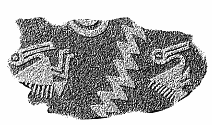
The makai [medicine man] worked around where these people were and found out that the Hohokam were going toward a mountain that they call "Gu do ak" (Big Mountain),[a] all frightened and running. There was no danger. Then he sang:
I am looking very sad (hu matchum)[b
]Feather water (an schrodek)[c]
[a] Ge'e Duag, 'Big Mountain'.
[b] Seems to be hemajim , 'kind', 'gentle', 'tame', 'sympathetic'.
[c] A'an su:dag[*] , 'long-feather water'.
I am going to big mountains
To the big mountain
Enemy woman looks good.
I am now looking sadly
At soft feather water
To the big mountain
Some of the children
Of my enemies
Are pretty.
Story 32—
Ending:
First Grave
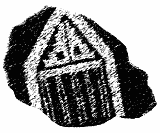
When they saw there was no danger close by, the [Wooshkum] people decided to make their home close to Komatke[d] mountain. Then the medicine man sang two other songs:
A sandy land I saw
And in this land
I make my home.
A sandy land mountain
I learned
I am going to make my home there.
[d] Komatk , 'Broad'. Pima-Papago name for Estrella Mountain, southwest of Phoenix, Ariz. Also the name of St. John's village, which is near the mountain.
While they made their home there, a leader of the other company [of Wooshkum] died. This man's wife was an old woman. She began to lead the people, who were called Chuch ma mike Oh tum, or horned toad people.[e] She took sick and was going to die.
At this time the people staying at Komatke were planning to leave again, and they told the other group, "When this old woman dies, you can leave and go on. We don't think there will be any more trouble."
So some were going to leave, and some were going to stay there. Then they said they would do something to show that the owl (chu kut )[f] does not belong here [in Pima-Papago country]. They made a rule: when a big bird builds its nest someplace, the owl will come and fight with the bird, chase it away, and lay its eggs in the nest.
This was true. When the owl found the nest of another bird, he fought the bird and took away its nest and laid its eggs there.
Early in the morning, before sunup, the people got ready to start their journey, and they sang:
I am leaving you and
I am going
The morning shining across.
[e] Cecmamaig (sing., cemamaig ) O'odham, 'Horned-toads Pima-Papago'.
[f] Cukud , 'owl', 'ghost'. In this story, the "ghost" as well as the "owl" meaning is present.
I am leaving you
And running away
The setting of the sun
Is shining blue.
Part went on their journey and part stayed, but they were all afraid because this part of the land was dangerous. When the old woman found out the thoughts [plans to stay and leave] of the people, she sang:
Over ahead of me the land
Seemed like a piece of rubber
I want to lead my people
But I cannot do it.
Ahead of me there are many
Mountains.
In these mountains
My mind is getting weak.
The people taking care of this old woman were her grandchildren. They sang:
Our grandmother
I wish you would die.
And everything will be all right.
Ahead of you the land
Seemed to be springy.
Grandmother,
We wish you'd fall pretty soon.
Ahead of you there are
Many mountains.
The old woman died, and they arranged her body in a grave like she was sitting down, close to these Komatke mountains. From that time, the grave where she was, was kept clean by the Pimas.
Story 33—
Ending:
Raven and Geehoduk
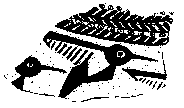
Soon after the old woman died, the people [who had stayed behind] moved closer to these [Komatke] mountains, where there were lots of bushes or trees in a thicket. There a raven and a bird they call geehoduk (like a pigeon)[g] had a fight. The raven was a Wooshkum and the geehoduk was Hohokam.
The bird like a pigeon made a noise like a pigeon, and the [Wooshkum] people were afraid. It wasn't long since the old woman had died, and they were sad all the time. They sang:
We have arrived
In the land of the thicket
In this the geehoduk
Is gladly singing.
[g] Unknown. Gi 'ihodag means "thinness," "leanness."
We have arrived
In the land of the thicket
In this the raven
Is gladly singing.
Story 34—
Ending:
Turkey Man
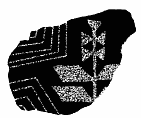
Soon after they sang those songs, the people moved west. Soon they came to the other [Wooshkum] people who had been ahead of them. They were getting close to the man that went before these people who used to live over here.[2] His name was Tovacule, "Turkey man."[h]
When he saw them coming, he turned himself into a skeleton. When they saw him, they were afraid. He sang:
I am turning myself
Into a dead person.
Your tomahawks are
Breaking all to pieces.
The Wooshkum hunted for the child who had destroyed the house at Casa Blanca [story 24]. When they found him, they asked him to kill that man.
[h] Tova Keli, 'Turkey Old-man'.
The child lay on the ground and twisted himself in every way. When Tovacule saw this, he made fun of it and said, "You ashes dumper, ma ta ya wa tum ,[i] you can't do a thing to me."
When the child's grandmother heard Tovacule say this, she was very mad, and she sang a song:
That is my poor boy
You have called him my poor boy
Pi vi cum (hawk) [j] bird is mighty strong.
So it was true. The child turned himself into a hawk and killed the old man Tovacule.
Story 35—
Ending:
Defeat at the Ocean People
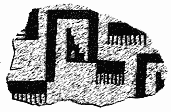
They fought those [Turkey Old-man] people and destroyed them all. They moved to the west, and whenever they came to a group of people, they destroyed them easily. They reached and crossed the red river, Wik Akima.[k]
At that time there were some people living close to the ocean. They knew these [Wooshkum] people
[i] Matai iawatam , 'ash dumper'.
[j] Unknown, not a known hawk name.
[k] Weg Akimel, 'Red River', equals the Colorado ("Red" in Spanish) River.
were coming and that they were destroying everyone they came to. The people by the ocean worked to make them thirsty and to make them lose their way.
The Wooshkum got thirsty and sang:
Ahead of me lies mirage
Ahead of me the land
Is nothing but mirage.
They got out of the heat that these people sent out, but then they lost their way. They sang:
Ahead of me lies nothing
But fog.
Don't you see
Ahead of me mountains
Are covered
With fog.
They went on and came out of the fog. Then they came to where these people were living, and they found that they were small people. They also found that their country was awfully cold. Snow fell all the time, and their houses were built into the ground. On top of them was nothing but snow.
They had a fight. The [ocean] people would come out from their houses, shoot at them, and go back in their houses. The Wooshkum couldn't do a thing to them because they were from a warm country and
could not stand the cold. The thunder tried but couldn't explode because it was too cold, and the chu dunk tried and couldn't do anything for the same reason.
The thunder sang:
Thunder,
I'm like the thunder
It hits
But it slips
To the other direction.
The chu dunk sang:
I am chudunk
I look like a chudunk
I am coming
From above.
After the Wooshkum couldn't do anything to these people, they held a meeting and decided not to bother them. If they kept on fighting, they might lose all their people, so they decided to turn back. They all came and turned their faces away from the [ocean people

The sun is going down.
I am now going back
On the road where I came from
[l] Apparently the same ceden[*] ('thump')-derived word that we encountered earlier, where it was said to mean "earthquake."
I am holding my cane
Against my breast.
The sun is going down
And I am returning
On the road that I came from
I am now running
I am holding my cane on my breast.
Story 36—
End:
Stop the War, Split the Water, Depart the God
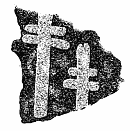
The Wooshkum started back to where they came from. When the people who lived there [cold ocean shore] saw this, they came from their houses and yelled and made fun of them, saying many things in their language that the Wooshkum did not understand because their languages were different.
The Wooshkum moved back this way sadly and came to a place where the ground was boiling.[3] They said they would fight this land, and that might make them happy. They sang:
I have gotten this far
With a shining rock
I have gotten this far.
And I have now folded the land.
I have gotten this far
With a shining rock
I have gotten this far
I have folded the mountains.
The bravest people tried to destroy the boiling water, but it acted very dangerous. It boiled, and all around it hot water splashed at a certain distance so no one could get close to it. Then the Coyote got his shield and tomahawk and went near to it. It splashed on him and turned into arrowheads which went all over into his flesh. He came out and said, "I did this so the people can learn how to kill their enemies with the shield and tomahawk."
Then he went to the ocean to doctor himself, singing:
Don't you think
That I am a real man
I have gone to the edge
Of a large body of water.
I met a medicine man.
Am I
A real, true medicine man

On the edge of a large body
Of water
I met a Nassya (White Eater).[4]
After this happened, Siuuhu sang to state that the war was all over:
I have placed myself
And I saw.
I have killed the enemy
I am carrying it across.
Let us run and see
It was Siuuhu who killed
And he has brought it.
The people moved on down this way. They came to the red river [story 34], and its waters were now very high. They couldn't go further. They camped there. Then they talked to a man who understands his arrows thoroughly. They asked him to help them get across.
He stood up and got one of his arrows and sang:
You called me
That I have the power
Of an arrow.
I have put my arrow
In the water.
And with [it] I am going
To break the water
In two.
This man couldn't do anything, so they stayed there all night. The next morning they went to a man with the power of thunder. He went and stood at the edge of the water, told the people to get ready, and sang:
You called me
That I have the power
Of thunder.
I am now standing in the middle
and with this
I am breaking the water
In two.
This thunder exploded and he went down into the water, and the water split in two and made a road. But just about the time the people were ready to go through, it came back together again.
So the thunder man couldn't do anything, and the people stayed there all night. The next morning they asked Siuuhu to try for them. He went down and stood at the edge with his cane in his hand and sang:
A bright morning cane
With it
I am breaking the water
In two.
He hit the water with his cane, and sure enough the water rolled back on both sides and made a road for the people who went down and came out on the other side. But among the people was a small child who was naughty. He cried and started back for the other [far] side, and his relatives went after him.
[m] Could be S-a'ap'emakam, 'Those-that-seem-normal', perhaps 'Those-that-try-it-out'.
When the waters closed ahead of them, they were left on the other side.
Siuuhu looked back to the people who were left on the other side. He told them it would be all right to make their home there, and they would become relatives of the Yumas. Then he told the rest of the people [who had crossed] that they must go to the land that they had won and make their home there. He also told them about the trees in this [present Pima-Papago] land, that when the trees get old they must chop their limbs off so they might start a new life again.
He also told the people that the Wooshkum and Hohokam must love each other and work together. He said that the five kinds of people ["sibs"] must get together and fight their enemies together, and he spoke especially about the Apache Indians who would be their enemies in the future. Then he spoke about the time when the war between Apaches and Pimas would stop, and they would make friends.
After he told them these things, Siuuhu went back to his home which is called Chok we cum (the place where the olla is, in which Siuuhu enclosed himself during the flood).[n] The people lived and made war with the Apaches until one time when this was
[n] Probably Cuk Wi'ikam, 'Black Remainder', of story 2. Most Papago stories say that he went to live at Baboquivari Peak, the highest point on the Papago reservation.
stopped and they made friends with each other. Apaches would [at one time in the past] come to visit the people here and eat with them here with whatever they raised on their farms.
So at one time a [Pima] woman was gathering mesquite beans somewhere, and she had a baby somewhere [with her]. The baby was crying, and just at that time some Apaches were close by and heard it. They went where it was and tried to nurse it to stop it from crying. They didn't mean any harm.
The mother came and was scared and went to where the Pimas were and told them that the Apaches got her baby. The Pimas went over and killed the Apaches, and they began to fight one another again.
They went on fighting, and finally a chief of the Apaches and a chief of the Pimas met together, talked things over, decided to stop the fighting, and did stop the fighting. From that time, the Apaches did come every once in a while and made friends with the Pimas and shared the things that the Pimas raised over here. Everything went on in peace.
At another time, there was a white man living at a place called "Vow pek" (Many wells, Maricopa Wells).[o] The Apaches stole some mules from him. He told the Pimas about it, and the Pimas went and
[o] Waiwpiak, 'Many-wells', near today's Maricopa, Ariz.
killed the Apaches. From then on they began to fight again. Then it came down to where the Government stopped the fighting, and the Apaches are our friends again.
That is why the old people say that this story is all true, what Siuuhu has done and said to the people from the beginning.
Supplement
The Old Woman's Death (Hendricks)
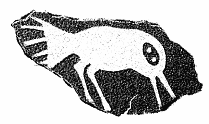
In the great throng of people who traveled with Elder Brother after he emerged from Ashes Hill,[5] there were two brothers who had their old grandmother with them. This little group could not keep up with the crowd when it was moving, and at evening they always camped a distance behind the others. The two brothers had to go in the evening and overtake the party to find what the people would do the next morning. They built a big fire and left their grandmother near it. They kept doing this for a long time, and at last they grew tired of it. The older brother said, "I guess we had better kill our grandmother and be able to travel with the rest, so we will know what is going on all the time. Perhaps we will meet some of the people we are going to fight, and
we would not be able to see them because we are always behind."
The younger brother said, "All right, but we must tell our grandmother and see what she will say about it." They told their grandmother and said, "Well, grandmother, we would like to know what you think of this plan that we kill you, because you know that we are always behind and do not know what is going on over there. So we thought we would kill you and keep up with the crowd." She said, "Well, grandsons, it is all right because I have been living a long time and have seen many things in this world. I would like you to be with the crowd and see what is going on." She sang the following song, but she felt so badly that she was crying rather than singing. (This quality of tone was imitated by the singer when recording the song.)
Oh! I have seen many things in this world and I have
been in this world a long time.
The old grandmother said, "After I die, find some fine sand and bury me in it. When you come back this way, stop and see what you find." The boys then sang the following song. They sang it four times, and when they came near the end of the fourth time, the grandmother began to die.
Our grandmother says it will be all right if she dies,
Because she has been alive a long time
That is why she does not mind dying,
Because we cannot keep up with the crowd.
The boys buried their grandmother in the sand and joined the crowd on its journey. As they were returning they came to the place where they had buried her, and they saw a plant growing. It was tobacco. Ever afterwards they did not smoke because they said the tobacco was the flesh of their grandmother. (Densmore, 1929: 27–30)